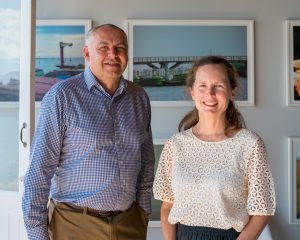Over the past week we have had two meetings with the leading executives of Calvary Health Care, discussing their unfolding strategies for creating new Baby Boomer customers – in partnership with State Governments. It is a wakeup call on the investment strength of the big Not For Profits.

Size does matter and Calvary is big, and diversified. After taking out listed aged care operator Japara in November 2021, Calvary now consists of 14 public and Private Hospitals, 65 residential care homes, 16 retirement villages and 19 community care service centres, with over 18,000 staff and volunteers.
Villages and integrated care
CEO Martin Bowles PSM told us at the time that the Japara move was two years in the making. He said the acquisition form part of a strategy to grow the organisation to deliver an integrated model of care which extends across hospital care, retirement living, residential care and home care.
“What was clear to us is that aged care and home-based care strategically is good,” he said. “We knew we had to have more and you do need some scale in this game.”
“Our real game is to be at the centre of integrated care, so how do you look after people in different phases, and we can do that because we have the hospital sector, the home-based sector including villages and now a very large presence in the residential care.”
Retirement villages are a central product and service for the plan.
“We’re trying to build a real village concept so it’s all part and parcel,” said Martin.
“I think you will see a blurring of home care and residential care over time,” he said. “People will want to be cared for in their own home.”
My Home Hospital, virtual and AI
But where Calvary gets really interesting is in its partnering with State Governments to relieve pressures on primary care systems. No retirement village operator to our knowledge has been successful in engaging with state governments strategically to achieve better outcomes for ageing Australians, despite numerous attempts. But Calvary is doing it across multiple States and Governments.
The My Home Hospital (MHH) service is a South Australian Health program delivered by the Calvary Medibank partnership – it operates a virtual care centre where patients are provided with a technology kit of devices and a tablet to enable remote monitoring.
6,000 South Australians kept out of hospital beds
The program has delivered real benefits to SA’s healthcare and aged care systems by reducing hospitals stays for elective surgery and the number of aged care residents being admitted to acute care.
Since its launch in January 2021, MHH has recorded 5,939 admissions – or around 250 admissions a month.
Of these, 728 or 12% were aged care residents who avoided admission to public hospital.
Over the recent holiday period, its clinical teams treated up to 120 patients a day who would have otherwise taken up a hospital bed.
6,000 COVID patients referred for screening by AI in one day
The second program is Calvary’s Covid Care at Home (CCAH) service, which was introduced during the COVID-19 pandemic across NSW, Victoria, Queensland and Western Australia and has also seen widespread uptake on the back of new public acceptance of telehealth.
The program – which connects with patients to assess their care needs and provides daily check-ups via phone until they are discharged – recorded 189,629 referrals between August 2021 and January 2023 – that’s over 10,000 referrals every month.
“That tool had the capability of doing 7,000 calls every hour,” added Vanessa Janissen, Calvary National Director Strategy and Service Development.
$154 million Calvary Kooyong Precinct continuum of care project
Billed as their landmark development in integrated care and being opened this month in Melbourne, Calvary Kooyong Precinct features a 32-bed sub-acute hospital, 83-bed three-floor aged care home and a 69-unit 11-level retirement village to cater to all stages of the ageing journey.
This is a big jump from a co-located retirement village. It requires big IP and big balance sheets to execute. And this is what say 20 Not For Profits have around the country. Their balance sheets give them the investment strength to leap ahead in AI and other technologies, but strategically more important is the trust they have in being a proven player to State Governments, who have access to all ageing Australians in need of a care pathway.
They are the elephants that will shape ageing accommodation and support.










